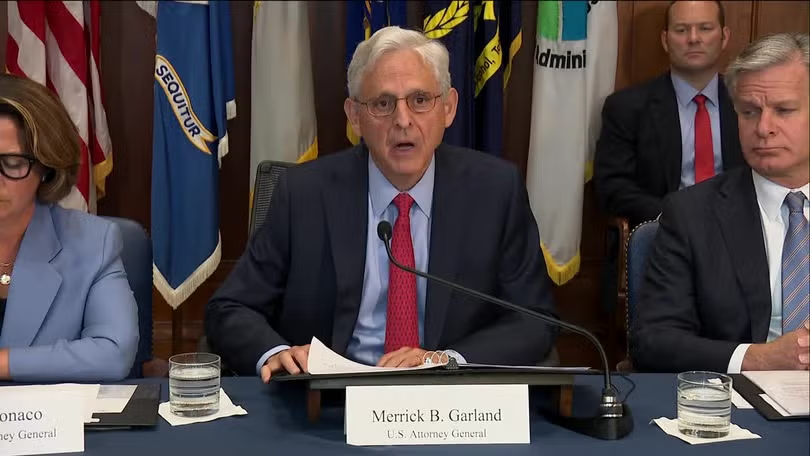
Authorities sanction, indict and seize website domains as Washington accuses Russia of interfering with 2024 US elections.
The United States has announced a range of actions to combat Russian influence in the November 2024 presidential election, as the Biden administration tries to prevent outsiders from swaying votes.
Two employees of Russian state media, Russia Today (RT), were indicted, dozens of internet domains were seized for “malign influence campaigns” and a new visa restriction policy was introduced as part of the efforts to check foreign influence.
Let’s take a look at what we know so far:
What did the government do?
The US Justice Department, State Department and the Treasury were involved in one of the largest coordinated government efforts against foreign influence based on research by the Federal Bureau of Investigation (FBI).
According to an indictment unsealed by the Justice Department on Wednesday, two senior employees of the state-funded RT used shell companies and fake identities to pay $10m to a Tennessee-based media operation to create content benefitting Russia.
US Attorney General Merrick Garland told reporters that the operation involved millions of followers and never disclosed that it was being directed by Moscow while falsely claiming it was being funded by a private investor.
The Russia-based defendants, Kostiantyn Kalashnikov and Elena Afanasyeva, have been charged with conspiracy to launder money and conspiracy to violate the Foreign Agents Registration Act.
The US-based targeted media operation was Tenet Media, which contracts a network of pro-Trump American influencers who publish right-wing content. Neither Tenet Media nor the Republican presidential candidate, Donald Trump, were named in the indictment but could be easily matched with the descriptions provided.
According to the Office of Foreign Assets Control (OFAC) of the Treasury, sanctions were imposed on a total of 10 individuals and two entities.
It said the designations complement the State Department’s blacklisting of the Rossiya Segodnya media group and five of its subsidiaries, RIA Novosti, RT, TV-Novosti, Ruptly, and Sputnik, as “Foreign Missions”.

The State Department has also imposed visa restrictions on the designated individuals and offered a reward of up to $10m for information pertaining to foreign interference in the US election.
The Justice Department separately announced the seizure of 32 internet domains “used in Russian government-directed foreign malign influence campaigns”.
What are US officials and media personalities saying?
The State Department and the White House have asserted that Russian President Vladimir Putin has been guiding some of the influence operations.
“We believe Mr Putin is weighing in on these actions,” National Security Council spokesman John Kirby said.
According to the US attorney general, the company that was allegedly set up by Russia in Tennessee published hundreds of videos with “commentary on events and issues in the United States, such as immigration, inflation, and other topics related to domestic and foreign policy”.
“The American people are entitled to know when a foreign power is attempting to exploit our country’s free exchange of ideas in order to send around its own propaganda,” Garland said, adding that the US judicial system is sending a message that it has “no tolerance” for foreign influence operations.
The Tennessee-based operation used a network of media personalities that included Dave Rubin, Tim Pool, Lauren Southern and Benny Johnson, who have a combined following of tens of millions on their social media pages.
Several influencers took to social media to say they had no knowledge of any Russian ties with the outlet that contracted them for content, and that they were “victims” of the alleged scheme.
“My lawyers will handle anyone who states or suggests otherwise,” 37-year-old right-wing commentator and YouTuber Benny Johnson wrote in a post on X, threatening against any accusation of him of working with Russia.
What is the Russian side saying?
The Kremlin has consistently denied allegations that it is actively interfering with US elections, with official comments at times trying to portray that Moscow may actually prefer a Kamala Harris presidency.
Speaking on Thursday, the Russian president offered sarcastic remarks on the Democratic nominee amid allegations that he prefers Republicans in the White House. Putin said Biden had “recommended to voters to support Ms Harris, we will also support her”, adding, “She laughs so contagiously that it shows that everything is fine with her.”
Ministry of Foreign Affairs spokeswoman Maria Zakharova said in a statement on Thursday that the Russian response to Wednesday’s moves in the US will be harsh and make “everyone shudder”.
RT responded sarcastically via a message published on its website by Deputy Editor-in-Chief Anna Belkina, who said, “They’re calling from 2016 and demanding all their tired cliches back.”
“There are three certainties in life: death, taxes, and RT’s interference in the American elections,” she wrote.

Why would Russia do this?
According to US authorities, Russia has been meddling in the upcoming US elections with the Ukraine war in mind.
Moscow allegedly wants to see Trump become president for a second time because the Republican candidate has repeatedly expressed his dissatisfaction with the tens of billions of dollars in aid to Ukraine.
Russia is also trying to sow divisions and unrest in the US and instil a sense of economic and political insecurity, according to US officials, who have also accused China and Iran of launching influence and meddling operations for years.
China and Iran have refuted the claims, with Tehran repeatedly denying involvement in the Ukraine war as well.
Iran’s mission to the United Nations wrote a letter to the Security Council on Thursday that said it is “both ironic and hypocritical” that the US, the United Kingdom and France continue to accuse Iran of contributing to the war considering their arms exports that have “prolonged” the war.
US authorities have said their efforts to counter interference operations are ongoing.





